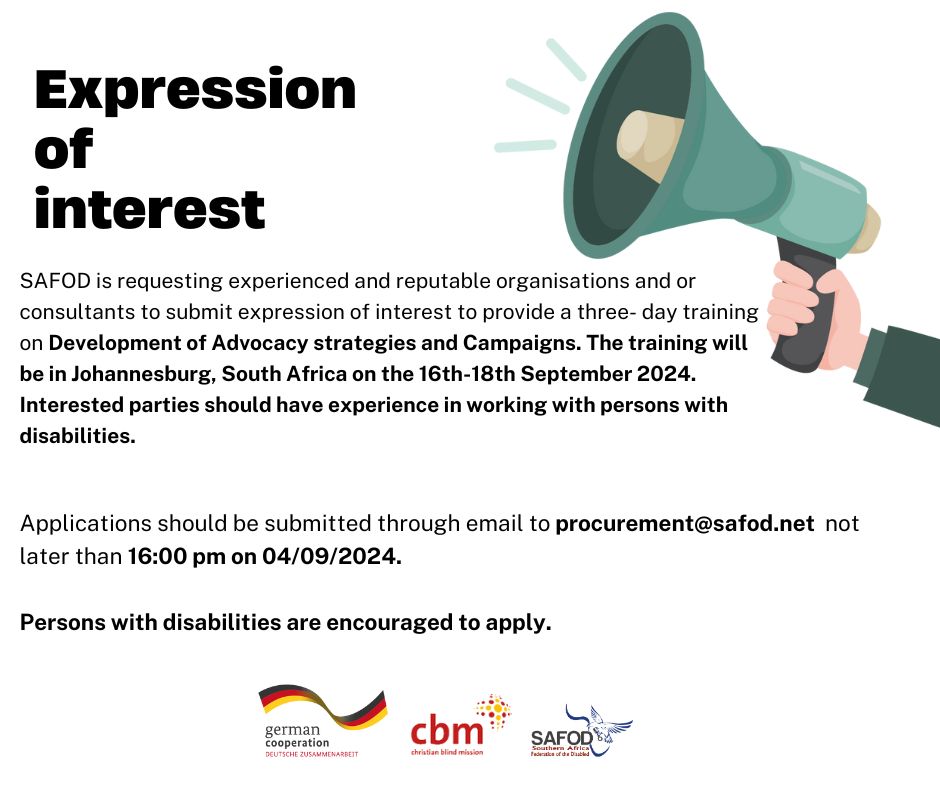EXPRESSION OF INTEREST -TERMS OF REFERENCE FOR ADVOCACY STRATEGIES AND CAMPAIGNS
01 September, 2024
BACKGROUND AND CONTEXT
The greatest global challenge of the 21st century is adapting to the consequences of climate change and associated extreme weather events. In particular, the region of south-eastern Africa is increasingly affected by extreme weather events such as prolonged droughts, heavy rainfall, floods, and cyclones, each of which is increasing in intensity and frequency, due to the intensifying El Niño Southern Oscillation (ENSO) phenomenon. In addition, these countries are in a tense economic and socio-political situation, which in turn exacerbates food and income insecurity (up to recurring hunger crises) for the population in the region, whose livelihoods are largely dependent on subsistence agriculture. The Sendai Framework for Disaster Risk Reduction (2015), the Paris Agreement (2016) and other internationally recognised guidelines and guidance (see IASC, ECHO) highlight the importance of the inclusion of persons with disabilities in humanitarian aid, disaster risk reduction and climate change adaptation. However, there is often a lack of appropriate translation into national guidelines and national action plans as well as their practical implementation. In addition, persons with disabilities and their representative organizations are often not included in the corresponding policy processes at national level and thus do not have the opportunity to adequately address and introduce their concerns. Representative organizations for persons with disabilities often lack the necessary capacities to enter into dialogue with highly technical and scientific disaster risk reduction and climate change adaptation institutions and organizations. Bringing these actors together is critical, as it can support to close advocacy gaps both at national and regional level, through exchange and networking.
INTRODUCTION
Southern Africa Federation of the Disabled (SAFOD) is a leading disability-focused network engaged in coordination of activities of organizations of Persons with Disabilities in the Southern Africa region. SAFOD plays a huge role in advocating for the rights of Persons with Disabilities as well as nurturing and strengthening it affiliates and other stakeholders in Southern Africa to ensure promotion of inclusive development and human rights for persons with disabilities. SAFOD is currently implementing a three-year project on enhancing disability- inclusive DRR capacities and strengthening resilience against climate-related disasters in Southeast Africa region. The project is implemented collaboration with Christian Blind Mission and seven other local partners, Adventist Development and Relief Agency and Zambia Federation of the Disability Organisations, (ZAFOD), Regional Psychosocial Support Initiative and Federation of Organisations of Disabled People in Zimbabwe (FODPZ) , Churches Action in Relief and Development, and Federation of Disability Organisation in Malawi (FEDOMA) and Malawi Council for the Handicapped. The objective of the project is to contribute to reducing the increased risk of persons with disabilities in climate change-related disasters by strengthening inclusive disaster risk reduction processes and climate change adaptation processes in Malawi, Zimbabwe and Zambia. The three countries were selected primarily because of their similar vulnerability profiles to extreme weather events such as drought, floods, cyclones and the long-term consequences of climate change.
OBJECTIVE OF THE ASSIGNMENT
One of the key activities implemented by SAFOD in this project is to strengthen the capacity of SAFOD, FEDOMA, FODPZ and ZAFOD to influence regional and national policy processes in DRR for inclusive DRR. In 2023, SAFOD conducted a policy analysis training targeting these OPDs. The objective of the training was to identify policy gaps and opportunities to strengthen inclusive disaster risk reduction and climate change adaptation at regional, national and local level. Building on this training, SAFOD will conduct a training on the development of advocacy strategies and campaigns. The objective of this training is to provide a framework for developing advocacy strategies and campaigns. The training will strengthen advocacy skills for OPD’s with a particular focus on development of key messages, advocacy tools, tactics and strategies. Therefore, SAFOD seeks to engage a consultant to facilitate a 3-day training on the development of advocacy strategies and campaigns.
OUTPUTS OF THE TRAINING
- Practical skills and knowledge in developing advocacy strategies, campaigns.
- Knowledge in developing relevant key messages.
- Knowledge in using advocacy tools such as social media.
DELIVERABLES
The expected deliverables from the consultant are as follows:
- A three-day training on development of advocacy strategies and campaigns.
-
Training materials such as PowerPoint Presentation and handouts/guidelines
-
Training report.
PARTICIPANTS
The training is targeting 15 participants: 5 SAFOD representatives and 3
representatives from each national federation (FEDOMA, FODPZ and ZAFOD).
LOCATION
The training shall be delivered physically in Johannesburg, South Africa.
QUALIFICATIONS AND EXPERIENCE
The desired qualifications and experience of the policy analysis trainer are as
follows:
- A minimum requirement of a bachelor’s degree in any relevant field such as public policy and governance, political science, development studies, communications and media, or a related discipline.
- Proven track record of having conducted advocacy strategies and campaigns training at a regional level
- Previous experience working with organizations of persons with disabilities.
- Strong facilitation and training skills, with experience in conducting interactive and participatory learning sessions.
- Excellent communication and presentation skills, with the ability to engage diverse audiences especially persons with disabilities. They should be able to facilitate group discussions and stimulate participation.
SUBMISSION PROCESS
The interested institutions/organizations or trainer must submit the following details:
- Resume
- Expression of interest (cover letter)
- Company profile if available
- Training guide
- Detailed budget estimates
All applications must be submitted to SAFOD through email at procurement@safod.net cc banthati@safod.net by 16:00 pm on 04/09/2024.
Persons with disabilities are encouraged to apply.



